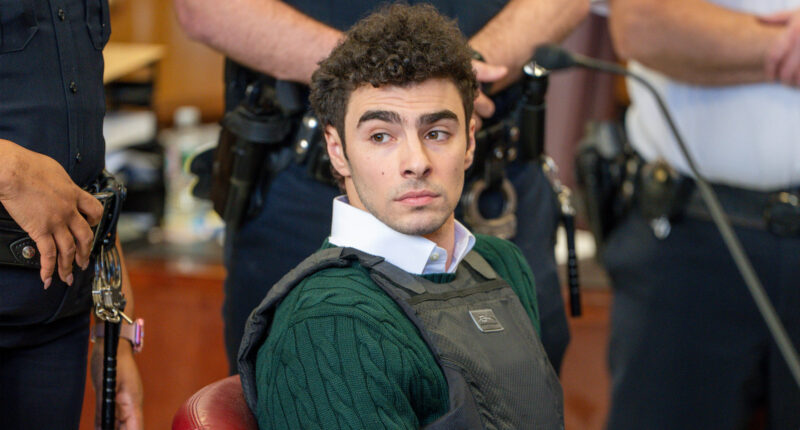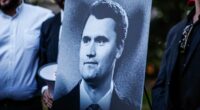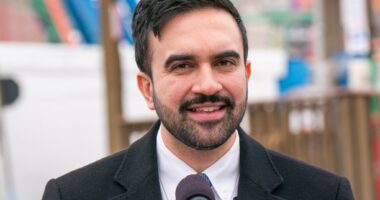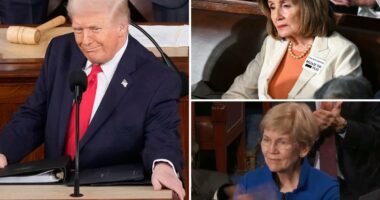Share this @internewscast.com
NEW YORK — A judge in New York has dismissed the terrorism charges against Luigi Mangione but has decided the murder accusation in the case concerning the UnitedHealthcare CEO’s killing will remain.
This is a breaking news update. Previous story is below.
Luigi Mangione is scheduled to appear in court on Tuesday as his attorneys seek to have the state’s murder charges dismissed in connection with the death of UnitedHealthcare CEO Brian Thompson. The defense contends that the state case, along with a corresponding federal death penalty case, constitutes double jeopardy.
Also to be decided: a trial date and whether the state case or federal case will go first.
This marks Mangione’s first appearance in the state case since February. The 27-year-old, who graduated from an Ivy League school, has garnered a following among those disenchanted with the health insurance sector. At his last court appearance, many supporters arrived, adorned in green to show unity, reflecting the color associated with the Luigi video game character. A comparable show of support was seen during his federal case arraignment in April.
If Judge Gregory Carro allows the state case to move forward, Mangione’s legal team has requested the dismissal of terrorism charges and wants to prevent the use of evidence gathered during Mangione’s December arrest, such as a 9 mm firearm and a notebook where he allegedly detailed plans to “wack” an insurance executive.
Prosecutors are pressing the judge to compel Mangione’s attorneys to clarify whether they plan to argue an insanity defense or present psychiatric evidence related to any mental health issues Mangione might have.
Mangione has entered a plea of not guilty to numerous murder charges, including one suggesting murder as an act of terrorism, over the Dec. 4, 2024, incident. Surveillance footage captured a masked assailant shooting Thompson from behind as he was heading to an investor conference at the New York Hilton Midtown. According to police, ammunition was marked with the words “delay,” “deny” and “depose,” mirroring a phrase often attributed to insurers’ tactics for avoiding claim payments.
Mangione was arrested five days later after he was spotted eating breakfast at a McDonald’s in Altoona, Pennsylvania, about 230 miles (about 370 kilometers) west of New York City and whisked to Manhattan by plane and helicopter. Since then, he has been held at the same Brooklyn federal jail where Sean “Diddy” Combs is locked up.
The Manhattan district attorney’s office contends that there are no double jeopardy issues because neither of Mangione’s cases has gone to trial and because the state and federal prosecutions involve different legal theories.
Mangione’s lawyers say the dueling cases have created a “legal quagmire” that makes it “legally and logistically impossible to defend against them simultaneously.”
The state charges, which carry a maximum of life in prison, allege that Mangione wanted to “intimidate or coerce a civilian population,” that is, insurance employees and investors. The federal charges allege that Mangione stalked Thompson and do not involve terror allegations.
U.S. Attorney General Pam Bondi announced in April that she was directing federal prosecutors to seek the death penalty for “an act of political violence” and a “premeditated, cold-blooded assassination that shocked America.”
The Manhattan district attorney’s office quoted extensively from Mangione’s handwritten diary in a court filing seeking to uphold his state murder charges. They highlighted his desire to kill an insurance honcho and his praise for Ted Kaczynski, the late terrorist known as the Unabomber.
In the writings, prosecutors said, Mangione mused about rebelling against “the deadly, greed fueled health insurance cartel” and said killing an industry executive “conveys a greedy bastard that had it coming.” They also cited a confession they say he penned “To the feds,” in which he wrote that “it had to be done.”
Mangione’s “intentions were obvious from his acts, but his writings serve to make those intentions explicit,” prosecutors said in the June filing. The writings, which they sometimes described as a manifesto, “convey one clear message: that the murder of Brian Thompson was intended to bring about revolutionary change to the healthcare industry.”
Copyright © 2025 by The Associated Press. All Rights Reserved.

















